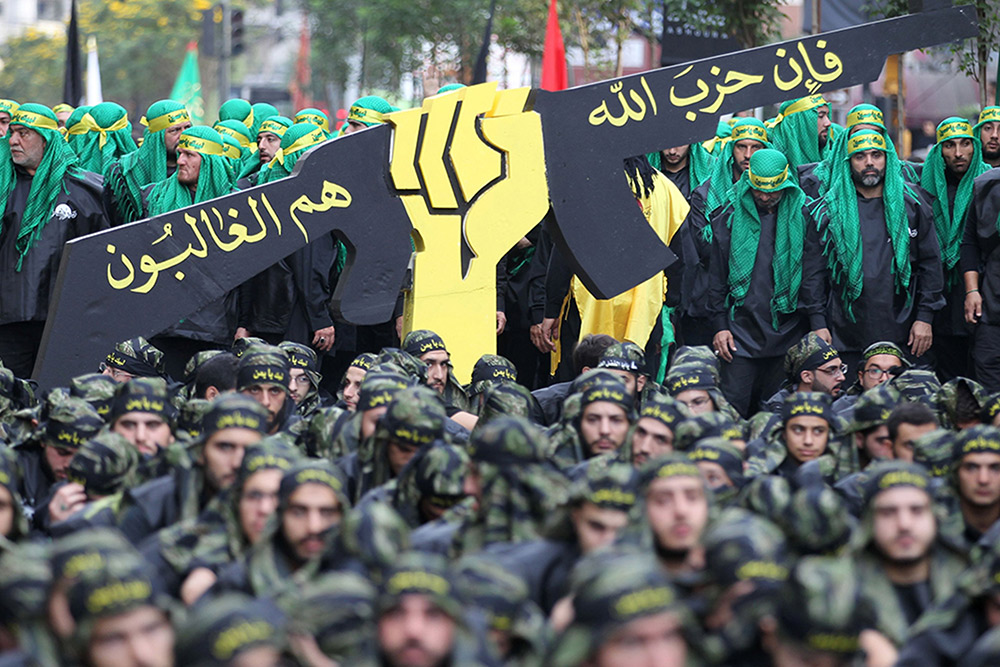 The main activity of militias which fight, for apparently religious reasons, against national governments or against certain countries considered as enemies (like the United States, Israel or the European Union) is to generate the enormous sums of money which are necessary for organize and recruit their army, to pay to provide them with arms, ammunition, gasoline and spare parts, to pay the salaries of the militiamen, to bribe the political leaders of the host countries who harbor or hide them. One militia considered one of the most effective in the world is that of Hezbollah in Lebanon, which earns nearly half a billion dollars a year[1], although among the contributions made by Iran, remittances from foreign supporters, industrial and commercial enterprises or donations. Anti-Iranian propaganda claims that Hezbollah can count on over $ 700 million a year just thanks to Tehran’s help[2].
The main activity of militias which fight, for apparently religious reasons, against national governments or against certain countries considered as enemies (like the United States, Israel or the European Union) is to generate the enormous sums of money which are necessary for organize and recruit their army, to pay to provide them with arms, ammunition, gasoline and spare parts, to pay the salaries of the militiamen, to bribe the political leaders of the host countries who harbor or hide them. One militia considered one of the most effective in the world is that of Hezbollah in Lebanon, which earns nearly half a billion dollars a year[1], although among the contributions made by Iran, remittances from foreign supporters, industrial and commercial enterprises or donations. Anti-Iranian propaganda claims that Hezbollah can count on over $ 700 million a year just thanks to Tehran’s help[2].
It is only later, within the leaders of these militias that they think about strategies, attacks or even military campaigns. It is for this reason that, from 1939, the United States set up an office intended to destroy these armies before military combat, by stopping their economic income[3]. The first sanctions against individual countries or affiliated organizations were decided by the alliance between the United States, the United Kingdom, the Soviet Union and France at the start of World War II and were aimed at reducing the supply of currency and raw materials to Hitler’s Germany[4]. These days, sanctions are generally set by the UN Security Council but coordinated by an office of the US Treasury Department: The Office of Foreign Assets Control (OFAC)[5].
It is difficult to say which organizations are terrorists and which have to be considered as opposition movements – the difference lies in the ideology of the observer and, therefore, opinions on the definition of “terrorism” have been split from birth of the United Nations. Since 1994, an agreement has been reached on the following definition: “These are criminal offenses which aim or are calculated to provoke a state of terror in the population or in a group of persons by humanly unjustifiable political actions, regardless of political philosophical, ideological, racial, ethnic, religious or other considerations”[6].
In this sense, Hezbollah can hardly be defined as a terrorist organization, even though OFAC has blacklisted all those who funded and supported its armed wing[7], the Islamic Jihad Organization (IJO)[8], which is officially disbanded, but which has to its credit numerous attacks[9]. Hezbollah, which was born as a Pan-Arab army in Beirut in 1982 to prevent an invasion of Israel[10], became an independence army during the Syrian occupation of Lebanon (1976-2005)[11]. After liberation, it became a political party that decisively influenced the nation: in the last elections, the list led by Hassan Nasrallah won 16.83% of the vote, making it the leading party in Lebanon[12].
In particular, after the peaceful uprising that in 2005 ended the war with Syria and forced the local armies to rebuild the most democratic system possible (the so-called Cedar Revolution[13]), Hezbollah was forced to diversify and to seek the support of the Lebanese electorate so as not to be crushed by new alliances within the Arab world – a coalition which has recently become an ally of Israel and, in the context of the Cold War, to which the Saudi Arabia opposes Iran, has decided to impose severe economic sanctions on Hezbollah, justified with the terrorism charge[14].
At first it was “only” a shopping center
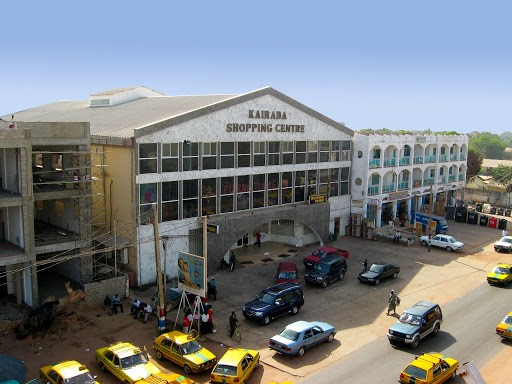
The Kairaba Shopping Centre in Banjul
One of the effects of this change has been the need to find new sources of funding – no longer politically motivated, but purely commercial – and to find them outside Lebanon[15]. If possible, clean up sources to avoid negative publicity from criminal organizations which, at least in the past, have been a backbone of the Hezbollah movement[16]. Our story tells how and why Hezbollah, at this historic moment of crisis, chose a small country in West Africa: The Gambia.
A story that starts from a shopping center in the heart of the capital Banjul and bears the name of the street on which it stands: Kairaba, which means “aqueduct” in the Mandinka language – because the street passes next to the old aqueduct built in the 18th century by English colonial rulers to bring water from the Gambia River to the most populous district of Serekunda[17]. The Kairaba shopping center is one of a kind and houses a post office, hawala office (now Western Union), two story hypermarket, cafe and in a building off the main hall with offices and small apartments to loan – all this remains open every day of the week from 9 a.m. to 10 p.m[18].
The mall is owned by Kairaba Shopping Center Co. Ltd. Banjul, which is owned by three shareholders: the first is Hicham Nmer Khanafer (also known as Hisham Khanafer), official representative of Hezbollah in The Gambia[19], who works mainly in the neighboring mosque (recruiting Lebanese from the diaspora and fundraising, to send her home) – the mosque which bears the same name as the street[20]. The second is the Consul General of Lebanon in The Gambia, Mohamed Bazzi, who manages the money that “belongs” to President Jammeh and with whom Bazzi bought the empty buildings that became the shopping center and the Kairaba Beach Hotel[21]. The absolute majority stake is held by Tajco Sarl Tire (Lebanon), which in turn is owned by the Tajideen family, who live in some of the apartments connected to the mall[22].
Tajco is a company importing agricultural and food products, tobacco, groceries, toys, jewelry, vehicle parts and household items, all of which are transported from Lebanon to the huge warehouse of a next to the Kairaba. The mall supplies the supermarkets of other Lebanese in the diaspora: Ali Ibrahim al-Watfa, Hezbollah ambassador in Sierra Leone[23], also a money collector and volunteer recruiter for the militias in Lebanon[24]. Abbas Loutfe Fawaz, Hezbollah Ambassador to Senegal[25], who performs the same functions in Dakar and owns the largest supermarket in the Senegalese capital[26]. Ali Ahmad Chehade, Hezbollah ambassador to Côte d’Ivoire[27], suspected of having protected and armed jihadist Abd Al Munim Qubaysi[28]. These people, over the years, have taken small minority stakes in Tajco and the Kairaba shopping center through the UCCM United Company for Central Market SAL Beirut – a company that sells products by multinational companies into supermarkets in each country inhabited by Hezbollah[29].
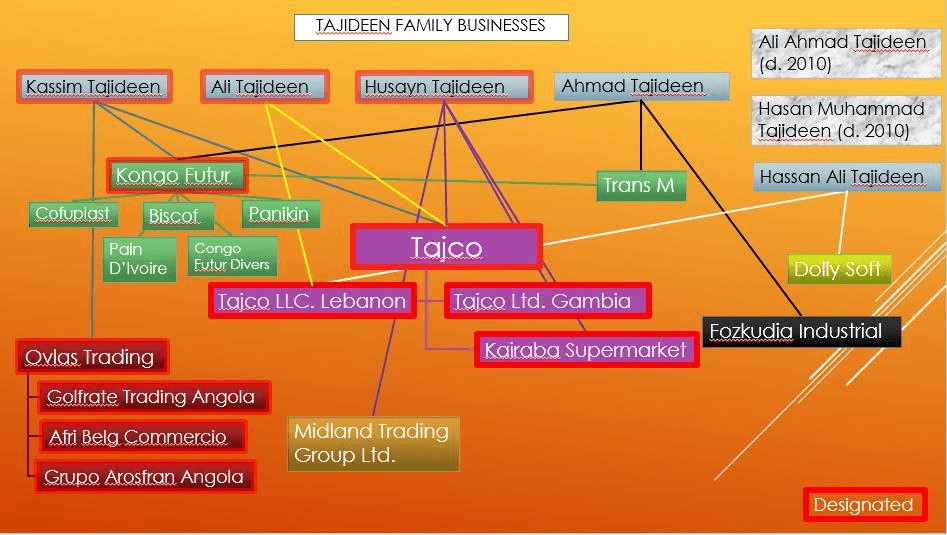
The commercial and business network of the Tajideen family[30]
As already mentioned, the Tajideen family lived in the early 1950s[31], after the death of their father (Ali Muhammad[32]), originally from the Lebanese country, in the capital of Sierra Leone, Freetown, then spent many years in Belgium[33] and the Ghana[34] and finally in Banjul: Brothers Ali, Husayn and Kassim settled there, like many Lebanese in the diaspora, in search of an underdeveloped country in which to invest their money and exploit their network of relations[35].
As our story began, in 1993, President Jammeh was the only one who knew all this (Tajco, through the bank accounts of the Jammeh Foundation for Peace, paid him $ 2.55 million in bribes[36]). As a result, he was subsequently accused by US courts of being a protector and an accomplice in the illegal actions of Hezbollah and its supporters during the 23 years of the Gambian regime[37]. Kassim, who lived in Belgium, with his wife Huda Saad, thank the income of the import / export company Soafrimex NV Antwerp, was arrested in Antwerp in 2003, then sentenced to two years in prison for smuggling diamonds and financing the terrorism[38], fraud and tax evasion (like his wife)[39].
Over the years, there will be numerous lawsuits against individual members of the Tajideen family in different parts of the world (Democratic Republic of Congo, Morocco, USA, etc.), but these will not affect in any way the group’s future growth, as victims of the Gambian regime and Hezbollah attacks abroad complain about the class action lawsuit brought against them[40].
Hezbollah in Banjul: from Prime Bank to Ecobank
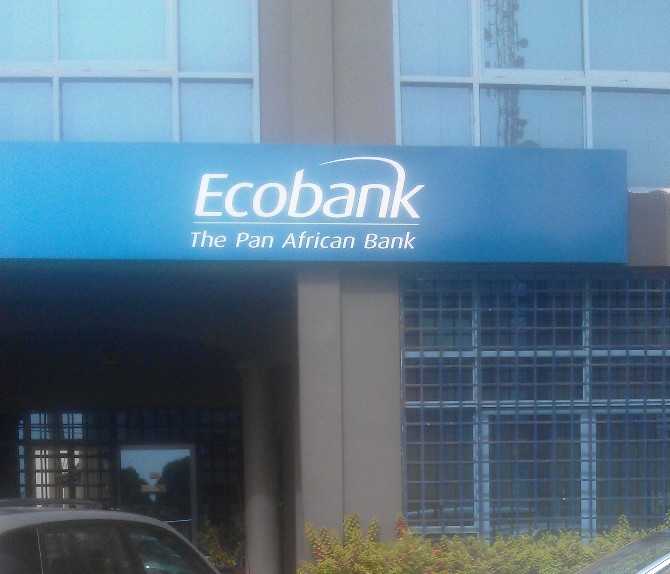
Ecobank Gambia, which bought the former Prime Bank Gambia offices at 42 Kairaba Avenue
Prime Bank (Gambia) Limited Serrekunda was founded on May 26, 2009[41], but its offices did not open until two months later, in July[42], as majority shareholders, the Lebanese-Canadian bank LCB of Beirut[43], wanted to join the inauguration Glamorous hosting – at that time, including Prime Bank, there were only twelve banks in The Gambia[44]. The offices are in the Kairaba shopping center complex, the shopping center in which only the products of one of Africa’s largest agricultural and food importers are sold: the Tajco Group[45]. Few people were in attendance for the bank’s inauguration, but shortly afterwards LCB President George E. Zard Abou Jaoudé visited President Yahya Jammeh[46]. They are such good friends that Jaoudé, leaving the meeting, told reporters: “President Jammeh is a magnet for investors. He is a very important personality at the international level and encourages all investors to invest in The Gambia”[47].
Why so much sympathy? Because Jammeh Jaoudé supports the project: LCB would have controlled 80% of the shares, including 29% only in trust, because the real shareholders cannot appear[48]. The remaining 20% will be subscribed by the managers of LCB with the intention of subsequently selling them to Gambian investors[49]. The list of secret shareholders is obviously the most interesting: it includes about 5% [50]of a drug and uranium trafficker well known in the world, a Colombian of Lebanese origin, Ayman Saied Joumaa, who is closely associated with Hezbollah[51] and who has been with OFAC for many years, for his criminal activities, has been blacklisted[52].
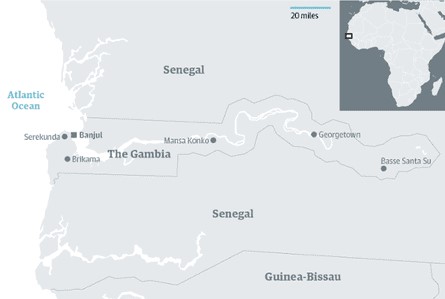
The thin strip of land (no wider than 25 km, only 350 km long) that runs along the Gambia River and forms the territory of one of the smallest countries on the dark continent
His name isn’t the only important one on the list. As we have already described, there are also names like that of Hisham Khanafer (head of Hezbollah in The Gambia), that of Hajj Hussein Tajal Din[53], his company Tradex SAL Beirut, Ali Ibrahim al-Watfa (head of Hezbollah in Sierra Leone) – names, which are known around the world as Abbas Loutfe Fawaz (leader of Hezbollah in Senegal) and Ali Ahmad Chehade (leader of Hezbollah in Ivory Coast)[54]. They are all Lebanese from the diaspora: starting with the war against the Ottoman Empire in 1860, then in several waves, because of war or poverty, more than 8 million Lebanese left the country during the 160 last years. They have new roots in the countries where they live today, which is why there are nowadays at least 12 million people of Lebanese origin spread all over the world, while Lebanon has only 4 million inhabitants[55].
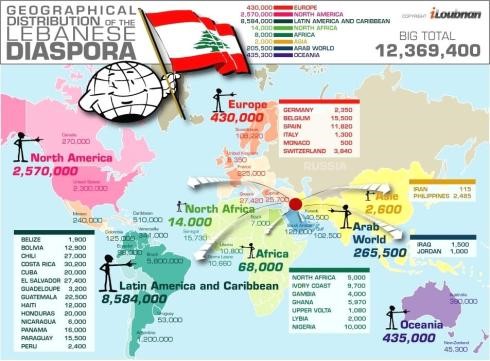
Geographical distribution of the Lebanese diaspora[56]
The Lebanese diaspora is made up of traders, bankers, scientists, artists (Shakira in Colombia, Selma Hayek, Omar Sharif and Paul Anka in the United States, guitarist Deep Purple Tommy Bolin and a thousand others[57]) and political advisers[58] notably in Africa – in Ghana, Ivory Coast, Senegal, Gambia, Nigeria, Sierra Leone[59]. Banjul, 160 km from Dakar as the crow flies and 660 km from Freetown, is a quiet place which gained independence in 1964 but which is firmly anchored in the Commonwealth and has enjoyed peace for more than 20 years under the leadership of Prime Minister Dawda Kairaba Jawara[60]. Years that have ended bitterly with the rise of Yahya Jammeh: a dictator who will bring misery, corruption and violence for 23 long years[61]. When Hezbollah decides to set up a bank away from prying eyes and in a location where there is a friendly government, it chooses Jammeh’s Gambia.
Prime Bank is an instant hit as it runs a Hawala office[62] and one of the members of the Western Union group[63]: The Gambia, although a small country of only two million people, is extremely interethnic and the group more importantly, the Mandinka, represent only a third of the population. Due to the weak state, at least a third of the population comes from elsewhere, is on the run, or is an illegal immigrant in search of work[64] and wandering between The Gambia and Senegal[65]. Gambians who live abroad contribute around $ 220 million annually[66] to the Lebanese economy through their remittances – in a country with a GDP of just over $ 5.5 billion[67].
In 2012, the CBG Central Bank of Gambia changes the rules applicable to banks and increases the minimum capital that must be deposited with the CBG to obtain a license: 200 million dalasi – or 3.8 million dollars[68]. It is in fact a measure which allows banks to guarantee their solvency, but it triggers a wave of panic in Banjul[69]: Prime Bank and many other banks in the Gambia go bankrupt and close[70]. The story could end here … but it didn’t. A week after the closure of Prime Bank Gambia, Ecobank Gambia opened its branch in its place[71]. The shareholders of Ecobank are two “new” Lebanese: Mohammad Ibrahim Bazzi and his son Wael – both linked to Hezbollah[72] – this place themselves whose office in the complex of the Kairaba mall, in the supermarket which sells only products from Gambia’s largest agricultural and food importer, the Tajco group[73].
Mohammed Bazzi lived in Banjul even before the opening of Ecobank: he was a partner of President Jammeh, who, thanks to Hezbollah money, first rose to the presidency and then to luxury[74]. Bazzi and Jammeh jointly founded the companies that import cars, gas and oil for Gambia: Global Trading Group NV, Euro African Group Ltd.[75], Africa Middle East Investment Holding SAL, Premier Investment Group SAL and Car Escort SAL Services[76] – all companies registered in Beirut but also based in Banjul.
Euro African imports Total’s products and holds the exclusive rights to service stations in the country[77]. Bazzi is in Banjul as the Consul General of Lebanon, but, in facts, he protects not only with Jammeh but also the President’s illegal income[78] and uses some of it for his own arms trade for the benefit of Hezbollah[79]. It is only when the now-ousted president is convicted of thefts and repeated human rights violations by his regime in 2017[80] that Bazzi’s name will end up in the cyclone[81] and be blacklisted by OFAC as international terrorists[82].
Ecobank Gambia already existed before Prime Bank: it was founded in 2007, and it was initially a purely financial company that housed a Hawala shop[83] and did not apply for a banking license from CBG until two years later[84]. Today, more than a decade later, Ecobank Gambia has 39,000 account holders and six branches across the country[85]. Hezbollah has officially sold Transnational Inc. Lomé (97.4%) to Ecobank and only a small percentage is in the hands of Group Investment Gambia Ltd. Banjul (2.6%), about which nothing is known[86]. The holding company, registered in Togo in 1985, is the largest pan-African bank (in terms of number of account holders) and has a large shareholder base from 33 different countries on the black continent[87].
Hezbollah buys from Canada: the history of the LCB
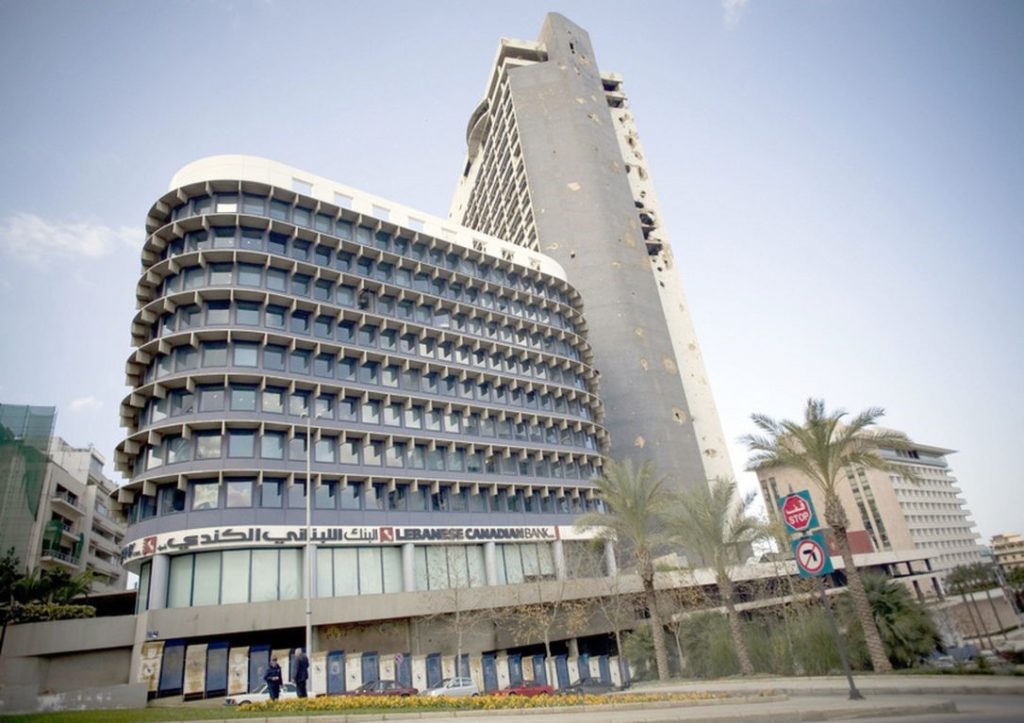
The headquarters of the Lebanese Canadian Bank in Beirut
George E. Zard Abou Jaoudé was born in 1952 (thus during the Lebanese economic boom[88]) and studied art and architecture at the American University of Beirut. In 1976 he got a job with Modern Design Company Ltd in Riyadh[89]: A company under French control and under the direction of Florentine architect Giuseppe Banci, who restored and beautified the entire Saudi Royal Palace between 1976 and 1988[90]. Thanks to the notoriety of this project, Jaoudé becomes one of the most fashionable architects in Arabia[91] and is in network with many entrepreneurs associated with the Al Sa’ud family, until 1988, on their advice, he bought BAE Banque d’Activites Economiques in Beirut – an institution founded twenty years ago by the Royal Bank of Canada, with a reputation for protecting funds made available to finance Maronite Christian militias in Lebanon[92]. Jaoudé of course changed BAE’s style and clientele and renamed the bank LCB Lebanese Canadian Bank of Beirut[93]. In the years that followed, the bank financed the explosion of Jaoudé’s career in the media, in ecology, but above all in construction[94].
Jaoudé’s rise is not without consequences. After the first rumors about clients who made money in the shadow of smuggling and money laundering (also because of the opaque transactions of the Congolese branch Sofibanque Sprl Kinshasa[95]) had already arrived in 2001 (clients who 2009 brought in more than $ 5 billion in investment funds for LCB),[96] in 2011 a first criminal case was opened in the United States on formal charges of being part of an international financial network that supports drug trafficking and the purchase of weapons from Hezbollah[97]: “This network has transported illicit drugs across West Africa from South America to Europe and to the Middle East and laundered hundreds of millions of dollars a month through accounts at LCB and through money laundering related to the consumer goods trade around the world, including through car dealerships in the United States”[98].
What happened? That Hezbollah’s bank, Bank Al-Madina SAL Beirut, drowned in a financial, criminal and political scandal linked to the assassination of Lebanese Prime Minister Rafiq Hariri (2005)[99], and LCB withdrew its bankruptcy branches purchased[100]. Obviously, most of the new clients are members of Hezbollah[101], and LCB offers them a new, more modern and secure system for transferring money from abroad to Beirut and from Lebanon to business, military and other partners. criminals around the world[102].
The touch that changes everything is the entry into the business of Munir Al-Kaloti, a Jordanian jeweler from Abu Dhabi, who founded the Kaloti Jewelery Group in 1988[103] and began to expand worldwide in less than a decade. Its success was seen entering the global gold trade[104] until Kaloti became one of the largest gold traders in the Middle East[105]. The US DEA discovered in 2010 that there were several arms and drug traffickers among Kaloti’s clients and that through the LCB they were converting goods into silver or gold. Kaloti allowed them to ensure the anonymity of all parties to the business – until US police began collecting evidence[106]. The DEA notes that cocaine shipments will be purchased in cash and deposited with the LCB in the accounts of two companies whose owners are unknown: Salor DMCC Dubai and Trading Track Company Ltd. Cotonou (Benin)[107].
In 2014, the investigation into Kaloti was extended to the Swiss Federal Prosecutor’s Office[108], as it turned out that between 2007 and 2015 suspicious and unjustifiable transactions totaling 9.3 billion dollars were carried out between LCB, Kaloti Jewelery and some Swiss gold banks and refineries[109]. In 2015, civil proceedings will be opened in New York against Jaoudé, the management of LCB, and a minority shareholder, Nest Investments Group[110], accusing Jaoudé of having ruined the bank through its criminal trafficking and its protection of Hezbollah assets[111].
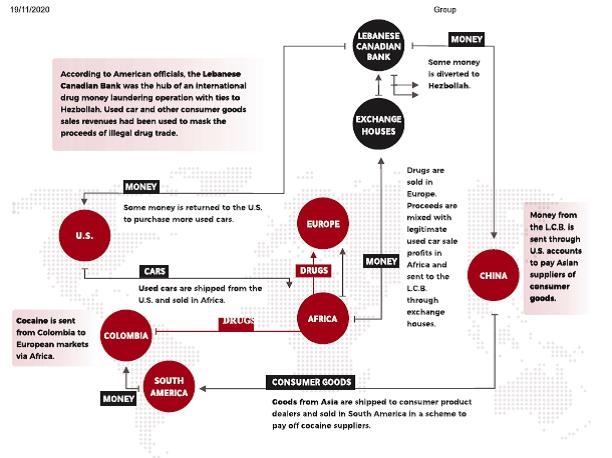
The Smuggling and Money Laundering Mechanism that focuses on LCB and Abu Dhabi Jeweler Munir Al-Kaloti’s Services[112]
Nest shareholders learn that one of LCB executives, Ahmad Ibrahim Safa, is son-in-law of Amin Muhammad Cherri, a Lebanese MP from the Hezbollah party, as well as a shareholder in the Lebanese communications group and partner of Adham Tabaja – one of the leaders of Hezbollah[113]. According to Nest’s lawyers, the Lebanese government has made matters worse by covering up Jaoudé’s misdeeds[114]. The Treasury Department also notes that the money Iran paid to Hezbollah also goes through the LCB, through that party’s ambassador to Tehran, Abdallah Safieddine[115], who works to disguise transactions with an accountant of Hezbollah, Mohammed Ibrahim Bazzi, who had worked for Iran’s central bank for two years[116]. Bazzi is the person who many years ago chose The Gambia to invest money, conduct transactions outside the eyes of the West and the Middle East[117], and therefore co-founded Ecobank first, then Prime Bank Gambia[118].
Hezbollah and Colombian drugs
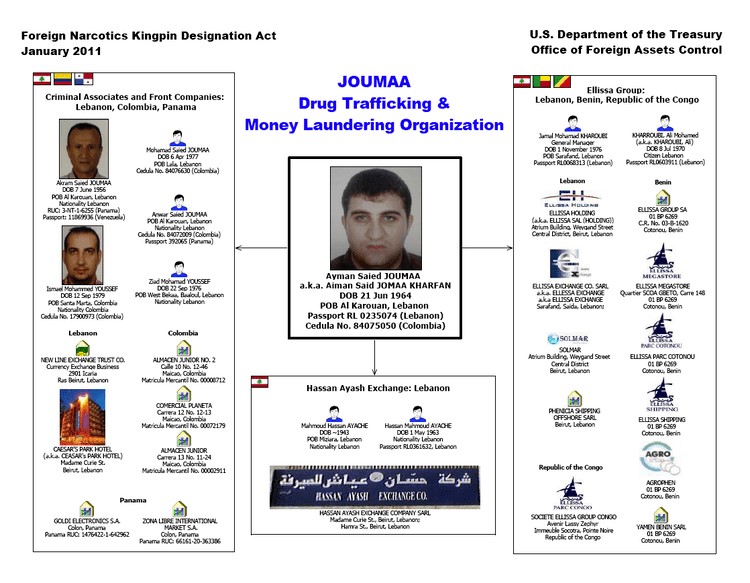
Diagram released by US Treasury Department explains Ayman Sayed Joumaa’s criminal relationship[119]
If you read this carousel of names, companies, claims, you quickly lose sight of the heart of the matter. More than 20 years ago a sharia banker (the Koranic law which claims in the economic field to deny the nature of capitalism and prohibits enriching yourself with bank interests or insurance contracts) explained to me exactly which one should be the real question. The developing world’s forces facing Goliath are less than David’s noose. They do not even have the crumbs of concentration of liquidity, mineral and natural resources, industrial and technological skills necessary to grow, advance and rule over the West.
That’s why they start to trade in agriculture and food, but if they try to create a party and an army like Hezbollah, it takes ten times longer: it’s necessary to withdraw that money wherever possible. The only quick and efficient way to get there, so far, is to use the means of organized crime, which is a sort of regulatory metronome of positivist capitalism. The legitimate product of the agricultural and food trade is used to finance the banks, which in turn use this capital to secure transactions that generate more income: drugs, weapons, slavery. That’s why a movement like Hezbollah, apart from pseudo-religious proclamations, takes root where the sense of loyalty of the Lebanese diaspora leads them to cooperate with their compatriots and to entrust them with their savings.
Unfortunately, this is not enough, and it does not work on its own. Back to the system that Bazzi, the Tajideen and the Jaoudé family have built with Tajco, the Kairaba Shopping Center and the LCB: over time, the rise in costs of the parallel structure (Hezbollah) overwhelms the bank, especially when it is struggling globally and, in order to survive, must neglect or even defraud the original account holders for enlisting the help of others, especially the drug lords. As noted, LCB is almost immediately forced to act as an intermediary in the heroin trafficking, valued at around $ 200 Million per month, organized by Ayman Saied Joumaa in South America (and marketed in Lebanon)[120].
The latter heads a cartel of drug traffickers and human beings called Los Zetas[121] in Mexico, but is discovered when his lieutenant Chekri Mahmoud Harb tells an undercover police officer[122] in 2007 how much of the money went to LCB; that the money comes from the cocaine trade and that will be used to finance Hezbollah[123]. For nearly five years, this trick remained unproven until Joumaa grew greedy and bought the Caesars Park Hotel in Beirut with money drawn from accounts with the LCB[124], which also funded Palestinian armed resistance, Hezbollah[125], and human trafficking. The same money that was put down as security to buy drugs in Los Zetas[126] and food for Tajco[127] and other Lebanese traders in West Africa[128].
As Western countries triggered the sanctions trap, Hezbollah orders Jaoudé, Bazzi and the others to sell the bank in order to save LCB and prevent the checking accounts captured around the world from being frozen and then confiscated – and chooses a another friendly institution as a buyer, SGBL Société Générale de Banque au Liban SAL Beirut (SGBL), which buys both the assets of Prime Bank Gambia in order to ensure the continuity of the current accounts of small clients[129] and of the LCB[130]. The US DEA claims, against the Lebanese authorities, that there are at least 200 suspicious AML bank accounts[131]. However, what Americans fear the most, is that in this way all managers and employees of Prime Bank and LCB remain in the system[132]. The funds of the Martyrs Foundation, which operates in both Lebanon and Palestine and is considered the financial arm of pro-Iran jihad, are not even touched[133].
SGBL executives reduced the workforce from 720 to 370 units and slowly closed the current accounts already identified by the American authorities[134]. But this is not enough. Today, SGBL is fighting to avoid a conviction that will force them to be put on the OFAC list and, worse, to pay billions in American class actions[135]. The war against Hezbollah, declared by the United States in 2010[136], does not stop (like the jihad in the Lebanese territories[137]): today the FPM (Free Patriotic Movement) is the party with the most parliamentarians in Lebanon and Hezbollah. It should aim to gain political power in the 2022 election without having to use weapons – something their leaders are reluctant to do[138].
Washington responds by claiming that the horrific August 4, 2020 incident in Beirut could be a Hezbollah bombing, and when that thesis proves to be unfounded, it argues that the fertilizer industry, which feeds the thousands of farmers and … Support food businesses that are scattered across Africa, unless they pose a threat to city safety – because fertilizers like the one that happened in Beirut can explode at any time[139]. The Trump administration has gradually blacklisted many FPM leaders from OFAC, starting with what is considered the most credible candidate for the future prime minister: Gebran Bassil[140].
However, that cannot change the reality of the Lebanese diaspora – and Hezbollah – in The Gambia. The Kairaba shopping center is still owned by Tajco, it is still the largest supermarket in West Africa, and the number of Lebanese living and working in The Gambia continues to grow[141], so social networks are developing applications aimed at meeting the children and grandchildren of the Lebanese emigration[142]. Ecobank is still where Prime Bank’s offices were, and relatives of the Tajideen family are still staying in the apartments on Kairaba Avenue. Over the years, I have become more and more convinced that the Arab banker I spoke to twenty years ago was telling the truth when he told me that a man who lives in peace with his family has a voucher work and whose children have strong prospects for the future, do not feel the desire to dress in grenades and blow themselves up in front of a building, but lives his life in search of happiness – whether Hezbollah or not .
[1] https://www.washingtoninstitute.org/policy-analysis/view/Hezbollah-finances-funding-the-party-of-god
[2] https://www.thenationalnews.com/world/the-americas/iran-pays-Hezbollah-700-million-a-year-us-official-says-1.737347
[3] https://www.linkedin.com/pulse/birth-ofac-rise-global-sanctions-paul-camacho/ ; https://www.acamstoday.org/birth-of-ofac-and-the-rise-of-global-sanctions/
[4] https://www.linkedin.com/pulse/birth-ofac-rise-global-sanctions-paul-camacho/
[5] https://home.treasury.gov/policy-issues/office-of-foreign-assets-control-sanctions-programs-and-information
[6] https://www.law.kuleuven.be/iir/nl/onderwijs/terrorisme/GAres51e210.htm ; https://www.juragentium.org/topics/wlgo/cortona/en/williams.htm
[7] https://english.aawsat.com//home/article/2151186/us-blacklists-lebanese-individuals-entities-over-Hezbollah-links
[8] Matthew Lewitt, “Hezbollah: The Global Footprint of Lebanon’s Party of God”, Hurst Publishers, London 2013
[9] Lawrence Wright, “Looming Tower: Al Qaeda and the Road to 9/11”, Knopf, New York 2006
[10] http://news.bbc.co.uk/2/hi/middle_east/4314423.stm
[11] Robin Wright, “Sacred rage”, Simon & Schuster, New York 2001, pages 15-16, 73, 85-86, 95-112; Fred H. Lawson, “Syria’s Intervention in the Lebanese Civil War, 1976: A Domestic Conflict Explanation”, in “International Organization”, volume 38, Cambridge University Press, Cambridge 1984, pages 451–480; https://www.aiswest.com/uploaded/2018_Summer_Work/History/Syrian_Intervention_in_Lebanon_1975-76_A_failure_of_strategy.pdf
[12] http://www.interior.gov.lb/AdsDetails.aspx?ida=281
[13] Pierre Blanc, “La Syrie au Liban : retour sur une fin d’occupation”, in “Confluences Méditerranée”, volume 3, L’Harmattan, Paris 2005, pages 201-215 – see https://www.cairn.info/article.php?ID_ARTICLE=COME_054_0201&DocId=32732&hits=4087+4078+4070+1131+1122+1008+1001+
[14] https://edition.cnn.com/2017/11/19/middleeast/saudi-arabia-iran-arab-league/index.html
[15] Matthew Lewitt, “Hezbollah Finances – Funding the Party of God”, The Washington Institute, Washington 2015
[16] https://www.jpost.com/International/US-Treasury-takes-new-action-against-Hezbollah-funders-310871 ; https://www.aljazeera.com/news/2008/10/25/nasrallah-decries-propaganda/ ; https://www.alarabiya.net/articles/2011/12/22/184043.html
[17] Pjilip Briggs, Simon Fenton, “The Gambia, 2nd: The Bradt Travel Guide”, Bradt Travel Guides, Chesham (UK) 2017 – see https://www.bradtguides.com/product/gambia/
[18] https://www.accessgambia.com/information/tajco.html
[19] https://www.nytimes.com/2013/06/12/world/middleeast/us-hits-Hezbollah-with-new-sanctions.html
[20] https://www.treasury.gov/press-center/press-releases/Pages/jl1980.aspx
[21] https://allafrica.com/stories/201811260290.html
[22] https://www.osenlaw.com/sites/default/files/BartlettAmended-2019-cv-00007.pdf, page 184-190; https://www.gfatf.org/archives/tajco/
[23] https://www.counterextremism.com/extremists/ali-ibrahim-al-watfa
[24] https://www.counterextremism.com/extremists/ali-ibrahim-al-watfa ; https://www.treasury.gov/press-center/press-releases/Pages/jl1980.aspx
[25] https://www.afrik.com/senegal-les-usa-denichent-un-chef-du-Hezbollah-a-dakar
[26] https://www.treasury.gov/press-center/press-releases/Pages/jl1980.aspx ; https://www.afrik.com/senegal-les-usa-denichent-un-chef-du-Hezbollah-a-dakar ; https://www.nytimes.com/2013/06/12/world/middleeast/us-hits-Hezbollah-with-new-sanctions.html ; https://www.treasury.gov/press-center/press-releases/Pages/jl1980.aspx
[27] https://www.reuters.com/article/us-usa-treasury-Hezbollah-idUSBRE95A15620130612
[28] https://www.treasury.gov/press-center/press-releases/Pages/jl1980.aspx
[29] https://www.linkedin.com/company/united-company-for-central-markets—uccm
[30] https://www.treasury.gov/press-center/press-releases/Pages/tg997.aspx
[31] https://www.africaportal.org/publications/war-and-peace-in-sierra-leone-diamonds-corruption-and-the-lebanese-connection/ ; https://media.africaportal.org/documents/6_War-Peace_sierraleone_Eng-Nov2002.pdf – see pages 10-12
[32] https://www.gfatf.org/archives/hassan-ali-tajideen/
[33] https://media.africaportal.org/documents/6_War-Peace_sierraleone_Eng-Nov2002.pdf
[34] https://www.gfatf.org/archives/hassan-ali-tajideen/
[35] https://www.reuters.com/article/us-hsbc-launder-sidebar-idUSBRE86C19I20120713 ; https://www.gfatf.org/archives/tajco/ ; https://www.gfatf.org/archives/hassan-ali-tajideen/
[36] https://www.osenlaw.com/sites/default/files/BartlettAmended-2019-cv-00007.pdf, page 203
[37] https://www.osenlaw.com/sites/default/files/BartlettAmended-2019-cv-00007.pdf, pages 201-205, 329
[38] http://www.idexonline.com/FullArticle?id=32413
[39] https://www.ajc.org/news/Hezbollahs-international-presence-and-operations#_ftn71 ; https://www.occrp.org/en/goldensands/profiles/mohamed-tajideen ; http://www.idexonline.com/FullArticle?id=32413
[40] The Tajideeen family controls the following assets: a) Kairaba Supermarket: Kairaba Supermarket is a subsidiary business of Tajco Ltd, with both companies naming Husayn Tajideen as the same point of contact and manager and using the same primary business address; b) Congo Futur, Kinshasa (AKA Group Congo Futur AKA Congo Futur Import): Congo Futur was expanded from commodities export to real estate, construction and logging. Illegal logging in DRC became a mechanism to expand into a lucrative field through Trans-M company (a subsidiary of Congo Futur), both owned by Ahmed Tajideen. Lately Trans-M changed its name into Cotrefor Ltd Kinshasa and Ahmed Tajideen was removed from its Shareholders, but the company was still operating as a subsidiary of Congo Futur. The company is one of the biggest logging trade companies in DRC (exporting rainforest timber mostly to the US). It has built a lot of modern luxury complexes in Kinshasa including Crown Towers and Futur Towers. Moreover, it controls the import of foodstuff in Congo, and is active in the manufacturing sector owning factories that produce plastic goods and processed foods. The company also stands accused of logging far beyond legal limits, dodging taxes and subjecting its workers to conditions akin to modern-day slavery; c) Ovlas Trading SA Tortola: In the 2000s, to facilitate the trade with Latin America and with the legal advice of Mossack Fonseca, the entity set up Ovlas Trading SA and the subsidiary, Ovlas Commodities SA Tortola (BVI), to disguise ownership. Ahmad Tajideen (AKA Tajiddin), Nadine Tajiddin and Nejmee Jaber-Tajiddin are the company’s Shareholders. Both companies have Lebanese ties and an address in Beirut; d) Golfrate Holdings (Angola) Lda Luanda: Kassim Tajideen acquired Luanda-based Golfrate Holdings (Angola) Lda in 2005 from a Malawian born British citizen. The company is believed to be Angola’s leading producer and distributor of essential consumer goods, employing more than 1,400 people and supplying a wide network of retail stores, supermarkets, etc. Nowadays Golfrate is a wholly owned subsidiary of Ovlas Trading, with part of its main operations located in Angola. Its subsidiaries: Golfrate Distribution Lda, Golfrate Food Industries Lda, Golfrate HPC Industries Lda, Golfrate Paints (Tintas de Dyrup) Lda; e) Afri Belg Commercio e Industria Lda Luanda, Angola: Afri Belg Commercio e Industria Lda, is a subsidiary of Ovlas Trading, and is presided over by Kassim Tajideen. The company has the following subsidiaries: Afri-Belg Supermercados, Cash&Carry retail Stores, Afri-Belg Construction and Afri-Belg Agriculture; f) Grupo Arosfran Empreendimentos e Participaçoes Sarl Luanda (Grupo Arosfran): Kassim Tajideen founded Grupo Arosfran in Luanda, Angola, in November 1991. He has been the primary decision maker and leader of Grupo Arosfran and a member of the Board of Directors. Grupo Arosfran is listed as either a branch or a subsidiary of Ovlas Trading on multiple international business websites; g) Afroliner NV Antwerpen – related to Kassim Tajideen; h) Epsilon Trading FZE Sharjah, UAE – Kassim Tajideen owned, controlled and benefited from this company. Thus, the United Arab Emirates (UAE) became a necessary location for transshipment and bank funding; i) ICTC International Cross Trade Company Ltd UAE – Kassim Tajideen owned, controlled and benefited from this company. Epsilon and ICTC are were front companies that helped redirect shipments and money flows; j) SICAM Lda Luanda, Angola controlled by Kassim Tajideen, used to procure and distribute goods throughout the world, including the United States; k) Angola became a logistical hub for acquiring and moving goods between Europe and Africa. However, the companies were likely front companies for the smuggling of conflict diamonds from troubled countries such as Angola, Democratic Republic of Congo (DRC), Liberia, the Republic of the Congo and Sierra Leone into Europe. Even after the Kimberley Process established restrictions on the sale of conflict diamonds in 2003, the diamond trade was likely what fueled the company’s profits and expansion – see https://www.treasury.gov/press-center/press-releases/Pages/tg997.aspx ; https://www.globalwitness.org/documents/18809/unsanctioned_trade_2017_lowres.pdf ; https://www.globalwitness.org/en/campaigns/forests/us-consumers-risk-funding-Hezbollah/ ; https://www.globalwitness.org/en/campaigns/democratic-republic-congo/exporting-impunity/ ; http://www.idexonline.com/FullArticle?id=32413 ; https://offshoreleaks.icij.org/nodes/10105384 ; https://www.treasury.gov/press-center/press-releases/Pages/tg997.aspx ; https://www.justice.gov/opa/press-release/file/952071/download ; https://sanctionsalert.com/indictment-of-lebanese-businessman-tajideen-points-to-bold-methods-of-sanctions-enforcement-by-doj-and-may-trigger-compliance-headaches-for-banks/ ; https://www.acamstoday.org/lessons-learned-from-kassim-tajideen-case/
[41] 04.08.2016 Prime Bank Gambia, Worldbox Gambia
[42] https://allafrica.com/stories/200905280397.html
[43] https://www.federalregister.gov/documents/2011/02/17/2011-3346/finding-that-the-lebanese-canadian-bank-sal-is-a-financial-institution-of-primary-money-laundering
[44] https://www.treasury.gov/press-center/press-releases/Pages/tg1057.aspx https://web.archive.org/web/20140719122332/http://observer.gm/africa/gambia/article/another-new-bank-inaugurated
[45] https://directory.africa-business.com/business/24933815f5/Kairaba-Shopping-Centre–Tajco-Ltd– ; https://www.accessgambia.com/information/tajco.html ; https://www.gfatf.org/archives/kairaba-shopping-center/
[46] https://allafrica.com/stories/200905280397.html
[47] https://allafrica.com/stories/200905280397.html
[48] 29.11.2013 Prime Bank Gambia Ltd; Securities Data Company Worldwide Mergers & Acquisitions – Complete Financials/Multiples Reports
[49] https://lb.linkedin.com/in/mona-choueifaty-5a888021 ; https://rocketreach.co/lebanese-canadian-bank-profile_b5c7d033f42e0d5d ; http://www.1stlebanon.net/liban/lebcanbank/managementfr.html
[50] Joumaa and his partners control 5% through their companies: C&D Cargo SA Panama (liquidated in April 2012, https://opencorporates.com/companies/pa/412442 ), Monte Grande Internacional SA Panama (which was merged with the first in January 2010, https://opencorporates.com/companies/pa/647375 ), Goldi Electronics SA Panama (active, https://opencorporates.com/companies/pa/642962 ), Zona Libre International Market SA Panama (merged with C&D in 2010, https://opencorporates.com/companies/pa/363386 ), and finally a Hezbollah trading company, with offices in Beirut, Cairo, Cotonou and Banjul, Phenicia Shipping Offshore Sarl Beirut ( https://sanctionlaw.com/ofac-kingpin-sdn-designations-come-pouring-in/#.X5vwSYhKjIU ). When the Joumaa clan is included in the black-list in 2011, the shares of these companies will be entrusted to SGBL Société Génerale de Banque au Liban SAL Beirut, which, a little later, will also acquire the LCB (https://libnanews.com/la-sgbl-rachete-la-lebanese-canadian-bank/ )
[51] https://www.facebook.com/notes/daphne-de-bichonville/the-uranium-route-from-venezuela-to-iran/462333560488183
[52] https://www.federalregister.gov/documents/2016/04/07/2016-07980/unblocking-of-specially-designated-nationals-and-blocked-persons-pursuant-to-the-foreign-narcotics ; https://www.treasury.gov/press-center/press-releases/pages/jl0196.aspx ; https://www.treasury.gov/press-center/press-releases/Pages/tg1035.aspx
[53] https://www.treasury.gov/press-center/press-releases/pages/tg997.aspx
[54] https://www.longwarjournal.org/archives/2013/06/treasury_designates.php
[55] https://www.lstatic.org/PDF/demographenglish.pdf
[56] https://identitychef.wordpress.com/2009/09/06/lebanese-diaspora-worldwide-geographical-distribution/
[57] https://en.wikipedia.org/wiki/Lebanese_diaspora
[58] https://web.archive.org/web/20131224114050/http://english.al-akhbar.com/node/14884
[59] https://www.lstatic.org/PDF/demographenglish.pdf
[60] Ousainou Darboe, “Gambia’s Long Journey to Republicanism: A Study in the Development of the Constitution and Government of the Gambia”, University of Ottawa, Ottawa 1979
[61] David Perfect, “The Gambia under Yahya Jammeh: an Assessment”, in “The Round Table – The Commonwealth Journal of International Affairs”, volume 99, Taylor & Francis, London 2010, pages 53-63; https://www.freedomnewspaper.com/2015/09/04/the-gambian-dictator-who-kills-his-own-family-members-to-stay-in-power/ ; https://gainako.com/president-jammehs-threats-mandinkas-gambia-irresponsible-repugnant-national-leader/ ; https://www.hrw.org/news/2019/06/26/gambia-women-accuse-ex-president-sexual-violence ; https://gambianewstoday.com/govt-jet-used-for-arms-trafficking-report-2/
[62] https://www.infomigrants.net/en/post/15630/five-things-to-know-about-migrant-remittances ; https://www.treasury.gov/resource-center/terrorist-illicit-finance/documents/fincen-hawala-rpt.pdf
[63] https://location.westernunion.com/gm/-/banjul/34d27687e7c10df0b56ffbc46d7e9ce7
[64] https://www.cia.gov/library/publications/the-world-factbook/geos/ga.html, topic People and Society
[65] https://deeply.thenewhumanitarian.org/refugees/community/2017/01/19/as-gambias-crisis-grows-refugees-face-struggle-for-asylum-in-senegal
[66] http://gambiandiaspora.net/wp-content/uploads/2019/08/DFTR2-Report-Jun-2019-1.pdf
[67] https://www.cia.gov/library/publications/the-world-factbook/geos/ga.html, topic Economy
[68] CBG Annual Report 2012, page 63; FOROYAA Newspaper (Serrekunda) “12 Banks meets D200 million minimum capital requirement, Prime Bank (Gambia) ltd went into voluntary liquidation”, January 22, 2013. https://allafrica.com/stories/201301220903.html ; https://thepoint.gm/africa/gambia/article/depositors-told-to-withdraw-savings-from-prime-bank
[69] http://gambianewsonline.blogspot.com/2013/01/prime-banks-liquidation-creates-panic.html
[70] https://thepoint.gm/africa/gambia/article/depositors-told-to-withdraw-savings-from-prime-bank
[71] http://www2.cbg.gm/finance-system/thebanks
[72] https://now.mmedia.me/lb/en/nownews/Hezbollah_buying_iranian_arms_from_gambia_paper_reports1 ; https://www.gfatf.org/archives/wael-bazzi/
[73] https://directory.africa-business.com/business/24933815f5/Kairaba-Shopping-Centre–Tajco-Ltd– ; https://www.accessgambia.com/information/tajco.html ; https://www.gfatf.org/archives/kairaba-shopping-center/
[74] https://rewardsforjustice.net/english/lebanese_hizballah_financial_network.html
[75] https://www.occrp.org/en/greatgambiaheist/the-inner-circle-that-helped-jammeh-steal-a-billion-dollars
[76] https://rewardsforjustice.net/english/lebanese_hizballah_financial_network.html
[77] https://www.occrp.org/en/greatgambiaheist/the-inner-circle-that-helped-jammeh-steal-a-billion-dollars
[78] https://www.occrp.org/en/greatgambiaheist/the-inner-circle-that-helped-jammeh-steal-a-billion-dollars
[79] https://www.freedomnewspaper.com/ ; https://now.mmedia.me/lb/en/nownews/Hezbollah_buying_iranian_arms_from_gambia_paper_reports1
[80] https://www.counterextremism.com/extremists/yahya-jammeh
[81] 2019.03.29 Commission of Inquiry against Jammeh; https://www.occrp.org/documents/greatgambiaheist/Bazzi%20testimony.pdf
[82] http://sidisanneh.blogspot.com/2018/05/mohammad-ibrahim-bazzi-classified-as.html ; https://home.treasury.gov/news/press-releases/sm0388
[83] https://www.compliancejournal.it/metodi-di-riciclaggio-sistema-hawala/
[84] https://www.ecobank.com/gm/personal-banking/countries
[85] https://www.ecobank.com/gm/personal-banking/countries
[86] http://www.afrimoneyfinance.com/entreprise/746
[87] https://ecobank.com/group/about-us
[88] http://archive.wikiwix.com/cache/index2.php?url=https%3A%2F%2Flvsl.fr%2Flinsurrection-au-liban-revolution-unite-et-crise-economique%2F
[89] http://www.gzagroup.com/About.aspx
[90] 2008.01.01 Giuseppe Banci, page 11
[91] http://www.gzagroup.com/RealEstate.aspx?ref=all
[92] Nitsana Darshan-Leitner, Samuel M. Katz, “Harpoon: Inside the Covert War Against Terrorism’s Money Masters”, Hachette, London 2017, chapter 12
[93] https://www.investigativeproject.org/documents/case_docs/2191.pdf ; http://www.gzagroup.com/About.aspx
[94] https://www.thebusinessyear.com/lebanon-2017/developers/b2b ; https://www.thebusinessyear.com/lebanon-2018/quality-in-focus/b2b ; http://www.gzagroup.com/About.aspx ; http://www.gzagroup.com/Default.aspx ;
[95] https://www.osenlaw.com/sites/default/files/BartlettAmended-2019-cv-00007.pdf ; https://sofibanque.com/
[96] https://www.treasury.gov/press-center/press-releases/Pages/tg1057.aspx
[97] https://www.govinfo.gov/content/pkg/FR-2011-02-17/pdf/2011-3346.pdf , https://www.treasury.gov/press-center/press-releases/Pages/tg1057.aspx
[98] https://www.treasury.gov/press-center/press-releases/Pages/tg1057.aspx
[99] http://content.time.com/time/world/article/0,8599,1123483,00.html ; https://calert.info/details.php?id=59 ; http://www.levantnetworks.com/2019/12/29/alleged-hezbollah-financiers-link-to-al-madina-bank-fraud/
[100] https://www.osenlaw.com/sites/default/files/BartlettAmended-2019-cv-00007.pdf
[101] https://www.osenlaw.com/sites/default/files/BartlettAmended-2019-cv-00007.pdf
[102] https://www.dw.com/en/lebanese-canadian-bank-linked-to-Hezbollah/a-15612492
[103] http://www.kalotipm.com/About-Us
[104] https://www.thenationalnews.com/business/the-uae-alchemist-who-turned-fields-of-scrap-into-a-factory-of-gold-1.305887
[105] https://www.icij.org/investigations/fincen-files/us-treasury-department-abandoned-major-money-laundering-case-against-dubai-gold-company/ ; https://goldbarsworldwide.com/PDF/NBA_39_KalotiGoldBars.pdf
[106] https://www.icij.org/investigations/fincen-files/us-treasury-department-abandoned-major-money-laundering-case-against-dubai-gold-company/ ; https://arij.net/investigations/Kaloti-Story-en/
[107] https://www.icij.org/investigations/fincen-files/us-treasury-department-abandoned-major-money-laundering-case-against-dubai-gold-company/
[108] https://medium.com/@DubaiLive/kaloti-money-laundering-scandal-b50cc351b9cc
[109] https://www.icij.org/investigations/fincen-files/us-treasury-department-abandoned-major-money-laundering-case-against-dubai-gold-company/
[110] Nest Investments Holding Lebanon SAL Beirut è una consociata di Nest Investments Holding Ltd Limassol, un gruppo finanziario cipriota che opera in 23 paesi e vale circa 5 miliardi di dollari. L’azienda è stata fondata nel 1989 da Ghazi Abu Nahl ed i suoi figli – una famiglia di profughi palestinesi che, nel 2005, ha acquistato un pacchetto azionario in LCB. Nel 2002 Nest ha fondato la Trust Bank Algeria SA Algeri, e cercava un partner per far crescere la sua banca in altri paesi africani, e Jaoundé ha venduto alla famiglia Nahl il 24% di LCB per 57 milioni di dollari. Quando il processo tra Nest e LCB entra nell’analisi documentale, Jaoudé si accorge che non potrà cavarsela, e vende la sua quota di LCB alla SGBL Société Générale de Banque au Liban SAL Beirut – see https://www.nestco.org/en/groupcompanies ; https://www.crunchbase.com/organization/nest-investment-holdings-limited ; https://www.trustre.com/en/ ; https://www.leagle.com/decision/infdco20180615e61 ; https://www.crunchbase.com/person/ghazi-abu-nahl ; https://markets.businessinsider.com/news/stocks/don-t-keep-business-in-the-family-beyond-two-generations-insurance-magnate-ghazi-abu-nahl-founder-and-chairman-of-nest-investments-advises-1027492527# ; https://middleeasttransparent.com/en/investor-in-leb-canadian-bank-files-suit-against-former-managers-lebanese-regulatory-official-Hezbollah-operatives/ ; https://www.investigativeproject.org/documents/case_docs/2191.pdf ; https://www.wsj.com/articles/SB10001424052702303990604577368212835080388 ; https://www.dailystar.com.lb/GetArticleBody.aspx?id=459068&fromgoogle=1
[111] https://lebanonleaks801189695.wordpress.com/2018/10/05/george-zard-abou-Jaoudé/ ; https://www.osenlaw.com/sites/default/files/BartlettAmended-2019-cv-00007.pdf ; https://middleeasttransparent.com/en/investor-in-leb-canadian-bank-files-suit-against-former-managers-lebanese-regulatory-official-Hezbollah-operatives/
[112] https://arij.net/investigations/Kaloti-Story-en/
[113] https://www.osenlaw.com/sites/default/files/BartlettAmended-2019-cv-00007.pdf
[114] https://middleeasttransparent.com/en/investor-in-leb-canadian-bank-files-suit-against-former-managers-lebanese-regulatory-official-Hezbollah-operatives/
[115] https://www.counterextremism.com/extremists/abdallah-safi-al-din
[116] https://www.counterextremism.com/extremists/abdallah-safi-al-din ; https://home.treasury.gov/news/press-releases/sm0388
[117] https://www.counterextremism.com/extremists/abdallah-safi-al-din ; https://home.treasury.gov/news/press-releases/sm0388 ; https://www.treasury.gov/press-center/press-releases/Pages/tg1057.aspx
[118] http://www2.cbg.gm/finance-system/thebanks.html
[119] https://alchetron.com/Ayman-Joumaa
[120] https://www.treasury.gov/press-center/press-releases/Pages/tg1057.aspx ; https://www.longwarjournal.org/archives/2013/06/treasury_designates.php
[121] https://abcnews.go.com/blogs/politics/2011/12/lebanese-drug-lord-charged-in-us-links-to-zetas-and-Hezbollah
[122] https://www.dw.com/en/lebanese-canadian-bank-linked-to-Hezbollah/a-15612492
[123] https://www.thehindu.com/opinion/op-ed/new-insights-into-the-sources-of-Hezbollahs-money/article2715120.ece
[124] https://home.treasury.gov/system/files/246/LCB%20Section%20311%20Finding.pdf
[125] https://www.washingtoninstitute.org/policy-analysis/view/Hezbollahs-european-enablers
[126] https://www.dw.com/en/lebanese-canadian-bank-linked-to-Hezbollah/a-15612492
[127] https://home.treasury.gov/system/files/246/LCB%20Section%20311%20Finding.pdf
[128] https://www.dw.com/en/lebanese-canadian-bank-linked-to-Hezbollah/a-15612492
[129] 04.08.2016 Prime Bank Gambia, Worldbox Gambia
[130] http://www.businessnews.com.lb/cms/Story/StoryDetails/890/SGBL-buys-LCB-assets
[131] https://www.osenlaw.com/sites/default/files/BartlettAmended-2019-cv-00007.pdf
[132] https://www.wsj.com/articles/SB10001424052702303990604577368212835080388
[133] https://www.osenlaw.com/sites/default/files/BartlettAmended-2019-cv-00007.pdf
[134] https://www.wsj.com/articles/SB10001424052702303990604577368212835080388
[135] http://www.businessnews.com.lb/cms/Story/StoryDetails/6875/11-Lebanese-banks-sued-for-knowingly-aiding-Hezbollah ; https://www.fdd.org/analysis/2020/09/23/hezbollah-finance-in-lebanon/ ; https://www.osenlaw.com/sites/default/files/BartlettAmended-2019-cv-00007.pdf, pages 27-31; 279-301
[136] https://www.govinfo.gov/content/pkg/CHRG-111shrg62141/html/CHRG-111shrg62141.htm
[137] https://www.reuters.com/article/us-lebanon-conflict-idUSL0742599820080509 ; https://thearabweekly.com/violence-erupts-beirut-calls-disarming-hezbollah
[138] https://www.aljazeera.com/news/2020/11/6/us-sanctions-lebanons-gebran-bassil-citing-corruption
[139] https://www.theguardian.com/world/2020/sep/17/us-accuses-hezbollah-weapons-ammonium-nitrate-iran
[140] https://www.aljazeera.com/news/2020/11/6/us-sanctions-lebanons-gebran-bassil-citing-corruption
[141] https://www.aljazeera.com/program/al-jazeera-world/2015/10/28/from-lebanon-to-africa/
Leave a Reply